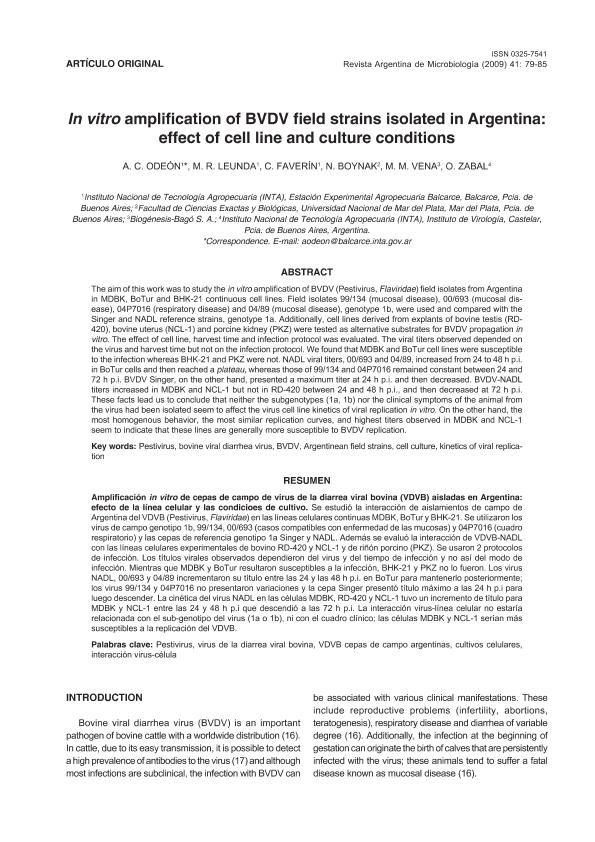Mostrar el registro sencillo del ítem
dc.contributor.author
Odeón, Anselmo Carlos

dc.contributor.author
Leunda, Maria Rosa

dc.contributor.author
Faverin, Claudia

dc.contributor.author
Boynak, Natalia

dc.contributor.author
Vena, M. M.
dc.contributor.author
Zabal, O.
dc.date.available
2019-07-18T21:43:13Z
dc.date.issued
2009-12
dc.identifier.citation
Odeón, Anselmo Carlos; Leunda, Maria Rosa; Faverin, Claudia; Boynak, Natalia; Vena, M. M.; et al.; In vitro amplification of BVDV field strains isolated in Argentina: effect of cell line and culture conditions; Asociación Argentina de Microbiología; Revista Argentina de Microbiología; 41; 12-2009; 79-85
dc.identifier.issn
0325-7541
dc.identifier.uri
http://hdl.handle.net/11336/79877
dc.description.abstract
The aim of this work was to study the in vitro amplification of BVDV (Pestivirus, Flaviridae) field isolates from Argentina in MDBK, BoTur and BHK-21 continuous cell lines. Field isolates 99/134 (mucosal disease), 00/693 (mucosal disease), 04P7016 (respiratory disease) and 04/89 (mucosal disease), genotype 1b, were used and compared with the Singer and NADL reference strains, genotype 1a. Additionally, cell lines derived from explants of bovine testis (RD-420), bovine uterus (NCL-1) and porcine kidney (PKZ) were tested as alternative substrates for BVDV propagation in vitro. The effect of cell line, harvest time and infection protocol was evaluated. The viral titers observed depended on the virus and harvest time but not on the infection protocol. We found that MDBK and BoTur cell lines were susceptible to the infection whereas BHK-21 and PKZ were not. NADL viral titers, 00/693 and 04/89, increased from 24 to 48 h p.i. in BoTur cells and then reached a plateau, whereas those of 99/134 and 04P7016 remained constant between 24 and 72 h p.i. BVDV Singer, on the other hand, presented a maximum titer at 24 h p.i. and then decreased. BVDV-NADL titers increased in MDBK and NCL-1 but not in RD-420 between 24 and 48 h p.i., and then decreased at 72 h p.i. These facts lead us to conclude that neither the subgenotypes (1a, 1b) nor the clinical symptoms of the animal from the virus had been isolated seem to affect the virus cell line kinetics of viral replication in vitro. On the other hand, the most homogenous behavior, the most similar replication curves, and highest titers observed in MDBK and NCL-1 seem to indicate that these lines are generally more susceptible to BVDV replication.
dc.description.abstract
The aim of this work was to study the in vitro amplification of BVDV (Pestivirus, Flaviridae) field isolates from Argentina in MDBK, BoTur and BHK-21 continuous cell lines. Field isolates 99/134 (mucosal disease), 00/693 (mucosal disease), 04P7016 (respiratory disease) and 04/89 (mucosal disease), genotype 1b, were used and compared with the Singer and NADL reference strains, genotype 1a. Additionally, cell lines derived from explants of bovine testis (RD420), bovine uterus (NCL-1) and porcine kidney (PKZ) were tested as alternative substrates for BVDV propagation in vitro. The effect of cell line, harvest time and infection protocol was evaluated. The viral titers observed depended on the virus and harvest time but not on the infection protocol. We found that MDBK and BoTur cell lines were susceptible to the infection whereas BHK-21 and PKZ were not. NADL viral titers, 00/693 and 04/89, increased from 24 to 48 h p.i. in BoTur cells and then reached a plateau, whereas those of 99/134 and 04P7016 remained constant between 24 and 72 h p.i. BVDV Singer, on the other hand, presented a maximum titer at 24 h p.i. and then decreased. BVDV-NADL titers increased in MDBK and NCL-1 but not in RD-420 between 24 and 48 h p.i., and then decreased at 72 h p.i. These facts lead us to conclude that neither the subgenotypes (1a, 1b) nor the clinical symptoms of the animal from the virus had been isolated seem to affect the virus cell line kinetics of viral replication in vitro. On the other hand, the most homogenous behavior, the most similar replication curves, and highest titers observed in MDBK and NCL-1 seem to indicate that these lines are generally more susceptible to BVDV replication.
dc.format
application/pdf
dc.language.iso
eng
dc.publisher
Asociación Argentina de Microbiología

dc.rights
info:eu-repo/semantics/openAccess
dc.rights.uri
https://creativecommons.org/licenses/by-nc-sa/2.5/ar/
dc.subject
Bvdv
dc.subject
Cell Culture
dc.subject
Kinetics of Viral Replication
dc.subject
Argentinean Field Strains
dc.subject.classification
Biología Celular, Microbiología

dc.subject.classification
Ciencias Biológicas

dc.subject.classification
CIENCIAS NATURALES Y EXACTAS

dc.title
In vitro amplification of BVDV field strains isolated in Argentina: effect of cell line and culture conditions
dc.type
info:eu-repo/semantics/article
dc.type
info:ar-repo/semantics/artículo
dc.type
info:eu-repo/semantics/publishedVersion
dc.date.updated
2019-07-11T19:24:29Z
dc.identifier.eissn
1851-7617
dc.journal.volume
41
dc.journal.pagination
79-85
dc.journal.pais
Argentina

dc.journal.ciudad
Ciudad Autónoma de Buenos Aires
dc.description.fil
Fil: Odeón, Anselmo Carlos. Instituto Nacional de Tecnología Agropecuaria. Centro Regional Buenos Aires Sur. Estación Experimental Agropecuaria Balcarce; Argentina
dc.description.fil
Fil: Leunda, Maria Rosa. Instituto Nacional de Tecnología Agropecuaria. Centro Regional Buenos Aires Sur. Estación Experimental Agropecuaria Balcarce; Argentina
dc.description.fil
Fil: Faverin, Claudia. Instituto Nacional de Tecnología Agropecuaria. Centro Regional Buenos Aires Sur. Estación Experimental Agropecuaria Balcarce; Argentina
dc.description.fil
Fil: Boynak, Natalia. Universidad Nacional de Mar del Plata; Argentina. Consejo Nacional de Investigaciones Científicas y Técnicas. Instituto de Investigaciones en Ingeniería Genética y Biología Molecular "Dr. Héctor N. Torres"; Argentina
dc.description.fil
Fil: Vena, M. M.. Biogénesis-Bagó S. A.; Argentina
dc.description.fil
Fil: Zabal, O.. Instituto Nacional de Tecnología Agropecuaria. Centro de Investigación en Ciencias Veterinarias y Agronómicas. Instituto de Virología; Argentina
dc.journal.title
Revista Argentina de Microbiología

dc.relation.alternativeid
info:eu-repo/semantics/altIdentifier/url/https://inta.gob.ar/sites/default/files/script-tmp-odeon-bvdvcelllines-09.pdf
dc.relation.alternativeid
info:eu-repo/semantics/altIdentifier/url/https://www.redalyc.org/articulo.oa?id=213016783004
Archivos asociados
